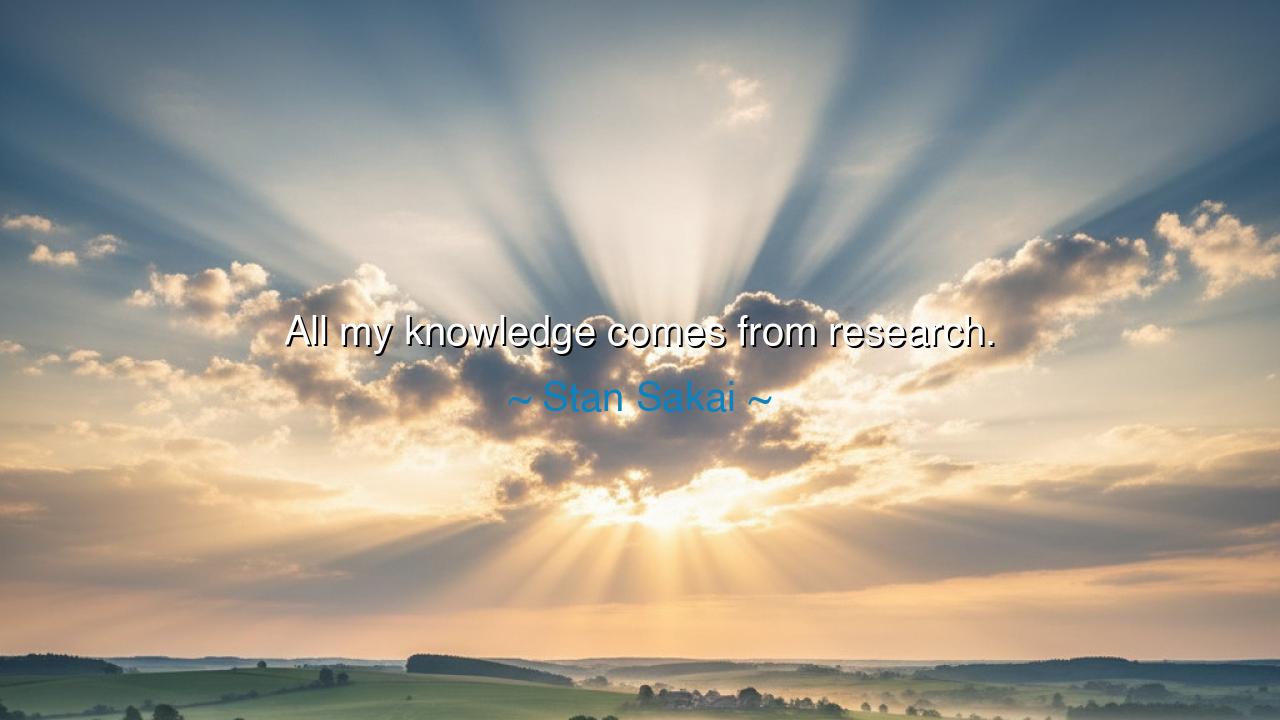
All my knowledge comes from research.






Stan Sakai, the creator of the legendary Usagi Yojimbo, spoke with humility and truth when he declared: “All my knowledge comes from research.” Though brief, this statement carries the weight of ancient wisdom. It reminds us that knowledge is not born from arrogance, nor from idle presumption, but from the patient work of seeking, questioning, and learning. In his words we hear the voice of one who has walked the path of the scholar and the artist, weaving history into story, and story into timeless teaching.
To say that all knowledge comes from research is to confess that wisdom is never accidental. The ancients knew this well. The philosopher who meditated beneath the olive tree, the monk who copied manuscripts in the candlelight, the astronomer who charted the stars—all were researchers. They labored, not in haste, but with diligence, gathering fragments of truth and piecing them together like mosaic stones into a grand design. Knowledge, therefore, is not inherited like gold, but mined from the depths of study and inquiry.
Stan Sakai himself was not content to merely invent; he sought to honor history. His tales of the samurai rabbit were not fanciful alone—they were grounded in the culture, traditions, and legends of Japan. He researched armor and weapons, rituals and landscapes, the flow of rivers and the curve of temples, so that his stories would not only entertain but also preserve. His art is proof that research transforms imagination into something enduring, for what is rooted in truth can carry across generations.
Consider the story of Herodotus, known as the Father of History. He traveled far and wide, listening to the stories of many peoples, writing down what he saw and what he heard. His research was not easy; it required journeys across deserts and seas, questioning kings and peasants alike. Though some mocked him for writing “tales,” his work gave future generations the first great tapestry of the human past. Without his diligence, much of the ancient world would have been lost to silence. Here again, we see that all knowledge is the child of patient inquiry.
The meaning of Sakai’s words is also this: that knowledge is not confined to the halls of universities or the libraries of scholars. Anyone who is willing to search, to ask, to read, to listen, may gather wisdom. The farmer who studies the changing of the seasons, the craftsman who refines his skill, the mother who learns from her child’s growth—all are researchers in their own way. The world is the book, and the curious are its readers.
The lesson, therefore, is plain yet profound: if you would be wise, you must be humble enough to admit you do not yet know. Pride blinds, but humility opens the eyes. Seek out books, ask questions, learn from the experiences of others, and do not cease in your search for truth. Remember that every great builder, every great teacher, every great artist began with research—the gathering of knowledge from the world around them.
And what should you do, child of the future? Begin today. Read not only what delights you, but what challenges you. Record the lessons of your elders before they vanish into the grave. Travel, if you can, and if you cannot, then let books carry you across lands and centuries. Let curiosity be your compass, and diligence your steps. For the man or woman who dedicates themselves to research will never hunger for meaning—they will find it written in every stone, every face, every story.
So hear the voice of Stan Sakai: “All my knowledge comes from research.” Carry it as a commandment. For the pursuit of knowledge is not a path with an end, but a lifelong pilgrimage. Walk it faithfully, and your life too shall become a story worth telling, rooted in truth, and flowering into wisdom.






AAdministratorAdministrator
Welcome, honored guests. Please leave a comment, we will respond soon